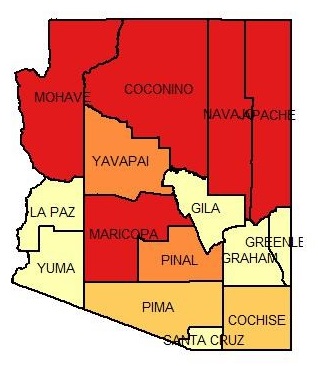Trends in vaccine hesitancy in the United States have led to the resurgence of several infectious diseases, including measles, mumps, and pertussis. Arizona’s regulation of nonmedical exemptions (NMEs) is relatively lenient compared to that of other states, contributing to the reduction in immunization compliance. Pertussis vaccines, in particular, have lower efficacy relative to other standard pediatric vaccines, thus making the population more susceptible to pertussis outbreaks should immunization rates fall below the recommended thresholds. For my scholarly project, we are conducting a retrospective analysis to determine whether geographic clusters of high NMEs in Arizona kindergarten classes in the 2012-13 and 2013-14 school years overlap with clusters of pertussis outbreaks during those time periods.
Vaccines have succeeded in eliminating several highly infectious diseases in the United States, such as smallpox, diphtheria, and polio [1]. Some of the most crucial policies in managing vaccine-preventable diseases have been school immunization requirements [2]. All 50 states allow for medical exemptions to immunization requirements, and 47 states will permit either religious or personal belief exemptions, collectively referred to as NMEs. While the national rate of childhood vaccine coverage has remained high in recent years, the number of geographic clusters with significantly lower vaccination rates has increased, particularly in states with more lenient NME policies [3]. With the seemingly reduced threat from the diseases themselves, a growing minority of parents has expressed concerns over vaccine safety instead, leading to increased vaccine hesitancy and subsequently a resurgence of outbreaks.
When it came time to select our scholarly projects, I already knew that I was interested in analyzing the link between vaccine exemptions and infectious disease outbreaks, a topic that appeals to my interests in both community health and quantitative data analysis. Thus, I wasted no time in reaching out to a potential mentor at the Arizona Department of Health Services (ADHS), Dr. Lisa Villarroel, the medical director of the Bureau of Epidemiology and Disease Control, who already had a perfect project in mind with all of the data already available through publicly accessible databases. Specifically, we would evaluate the geographic correlation between recent outbreaks of pertussis in Arizona to NME rates in kindergarten classes, which are generally indicative of community compliance to standard vaccinations, to determine whether there is a statistically significant overlap.
If the results from our study support an overlap between NME and pertussis clusters, then it will add to the growing body of research suggesting that higher rates of NMEs put communities at higher risk for outbreaks of previously controlled infectious diseases [2, 4-6]. Arizona is among the more lenient states regarding NME procedures, requiring only a form signed by a parent [7]. Demonstrating a correlation between NME rates and pertussis within Arizona would support a change in the state’s policies regarding NMEs to protect against not only pertussis but also other vaccine-preventable diseases. Furthermore, it could encourage the state to increase trust and improve communication between the medical community and the general public regarding vaccines and overall health education.
- Diekema DS. Personal belief exemptions from school vaccination requirements. Annu Rev Public Health. 2014;35:275-292. doi:10.1146/annurev-publhealth-032013-182452.
- Omer SB, Pan WKY, Halsey NA, et al. Nonmedical exemptions to school immunization requirements: secular trends and association of state policies with pertussis incidence. JAMA. 2006;296(14):1757-1763. doi:10.1001/jama.296.14.1757.
- Wang E, Clymer J, Davis-Hayes C, Buttenheim A. Nonmedical Exemptions From School Immunization Requirements: A Systematic Review. Am J Public Health. 2014;104(11):e62-e84. doi:10.2105/AJPH.2014.302190.
- Feikin DR, Lezotte DC, Hamman RF, Salmon DA, Chen RT, Hoffman RE. Individual and community risks of measles and pertussis associated with personal exemptions to immunization. JAMA. 2000;284(24):3145-3150.
- Atwell JE, Van Otterloo J, Zipprich J, et al. Nonmedical vaccine exemptions and pertussis in California, 2010. Pediatrics. 2013;132(4):624-630. doi:10.1542/peds.2013-0878.
- Omer SB, Enger KS, Moulton LH, Halsey NA, Stokley S, Salmon DA. Geographic clustering of nonmedical exemptions to school immunization requirements and associations with geographic clustering of pertussis. Am J Epidemiol. 2008;168(12):1389-1396. doi:10.1093/aje/kwn263.
- Arizona Department of Health Services | Immunization Program. http://www.azdhs.gov/phs/immunization/index.htm. Accessed February 16, 2015.
Sophie Sun is a medical student at The University of Arizona College of Medicine – Phoenix, class of 2018. She completed her undergraduate degree at UC Berkeley and earned a PhD in chemical biology from The Scripps Research Institute, where she focused on unnatural amino acid incorporation and antibody engineering. Some of her current academic interests include student-run free clinics, vaccine compliance, and accountability in research. However, she might sound more excited when talking to you about classic American cinema, urban compost collection, and French dessert recipes. She is currently pursuing a career as a Med-Peds physician.


